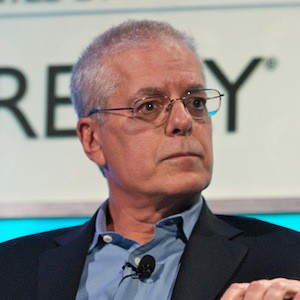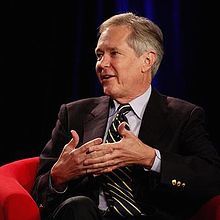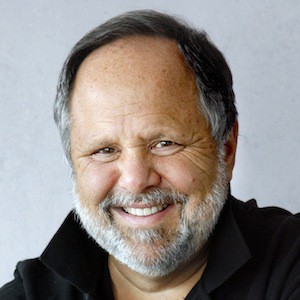Martin Nisenholtz: We are here on February 28th, 2013 with Ken Richieri, who is the general counsel of The New York Times Company and past general counsel for New York Times Digital. Let’s start with something that just broke in the news and then go back. The AP/Meltwater suit. First, could you just describe the suit and tell us why the Times decided to back the AP in this case? Second, if you could, I’d like you to contrast it from a copyright perspective to two other news services, the Huffington Post and Google News. We never sued Google News or the Huffington Post. These guys must be doing something materially different. Or we just simply made a mistake in not going after those two.
Ken Richieri: We haven’t sued Meltwater. All we did was put a brief in in support of AP.
Martin: OK, got it.
Ken: Meltwater is an interesting company. They’re basically in the media monitoring space. In so doing, they and their competitors supplanted a longstanding industry that used to do this in the analog world, the clipping services. Most of the other competitors, like Burrelles, that I think is now a different name, as they’ve migrated to the Web, they’ve kept their licenses. They still pay for the content that they distribute to their client. Meltwater does not. Meltwater takes its content by scraping articles on the Web and then delivering it to its clients. The issue really comes down to one of fair use. They maintain that they’re not taking too much of each article and that they’re within the limits of fair use for various reasons. There’s a big case in England that they just lost, a huge case. England has a much more constricted view of fair use. That put them a little bit on the defensive. That’s what caused the AP to sue them here.
Martin: Could we talk about fair use a little bit as a legal concept? It seems to me that it’s a common thread through the whole history of this era.
Ken: It absolutely is. Particularly in a world starting in the ’80s with the famous Berne Convention, where the formalities of copyright were done away with, copyright, taken literally and expanded to everything as it now is, is a very limiting doctrine. For example, it used to be to get a copyright, you had to actually register your work. Remember that little C in the circle? That’s what that was all about. If you felt something was worthwhile, you paid a registration fee, you’d send a copy to the registrar of copyrights, who would send it to the Library of Congress for their deposit copy, and you’d have the copyright. But now all that is gone. A lot of people still do that. They just like the art of that. In fact, if you’re taking notes on my conversation, those notes are copyrighted the minute they are fixed in a tangible medium. Everything is copyrighted. If you don’t have some concept of fair use, it’s like an engine without grease. It would just bind up. The system wouldn’t work. Fair use is a concept that says, “Yes, people have ownership in these expressive works. But others, under certain circumstances, can make use of them. A fair use.”
Martin: How did that concept extend to the Web? It seems to me that much of the Web is based on the idea of fair use,
Ken: That’s right. The Web wouldn’t be possible without a robust application of fair use. As you know, since we’ve worked together a long time, I came to copyright law through an odd direction. I came through a First Amendment background. Most copyright lawyers, their whole world has been representing owners, studios, and authors, and licensing things. I came in a different way. I’ve always had a more expansive view of fair use anyway. As a result, I think it was actually easier for me to transition to the world that the Web creates.
Martin: Is that a good thing?
Ken: Yeah, I think it’s a good thing. I think it’s a very good thing. First of all, a couple of things on fair use. The Web didn’t change the underlying rules. The rules of fair use and the considerations are the same, but the applications are totally different because of what the technology enables. What it does is, it puts a lot of challenges and stress on the rules of fair use. Just take a simple example. It’s not going to be exactly legally correct, but I’ll use it as an example. Let’s say basically in concept, fair use says, “If I make a copy of a record on my reel-to-reel tape deck and I give a copy to my friend, that’s OK. Or I use it in my house. that’s OK because the use of friends is different from a commercial use.” Let’s say that’s the general rule. That’s fine, but what happens when something like Facebook comes along and lets you have “friends” numbering in the hundreds of thousands? What does that do to that rule? In many ways like that, the Web has put pressure on the concept of fair use. Most of it has been to expand fair use. I believe that’s good, I believe it’s good for the country, I believe it’s good for creators of conten,; I believe it’s good for everybody. I also think it has limits. If we go back to the Meltwater case, essentially their business model is to take AP articles, to sell those AP articles to their customers and to get money for that. And not to give the AP any money. That’s a great freaking business model, but at its heart it’s not fair.
Martin: OK. Is it fair then for The Huffington Post to put a small excerpt on a page with a link, to create what is known at The Huffington Post as a B page, which has the author’s picture and a little bit more content, and in essence monetize those B pages through advertising? Why is that not…
Ken: You’re getting a couple things confused in there. I think The Huffington Post, I pay much less attention to them now then I used to. In their earlier iteration, came a lot closer to the line and probably went over the line in some ways. You could say they built their business on infringement and they pulled back as they got bigger. What you’re talking about isn’t really fair use in copyright. It’s their interesting way of trading on people’s reputations and trademark. Because what you’re saying is, “They’ll have a piece on somebody. Then there will be a flat page about a person with a bio. Almost as if they have a relationship with The Huffington Post. When they wouldn’t know The Huffington Post if they tripped over them in the dark.” That’s not really a copyright issue. But I see why you raise it. There’s a similarity. Certainly, the web enables many devices, technologies, and applications that can create an appearance of a relationship and allow you to monetize that relationship when none existed. It allows you to extract value away from the person who, on some cosmic level, deserves it, to that site. Absolutely, that happens.
Martin: I guess the other question has to do with the value itself. In other words, the notion that folks like Jeff Jarvis have put forward is this notion of the link economy. Google News is a great example of that. Where freely available links across the web lead to greater page views on the part of content providers, which are monetized through advertising. The question is, in a world where advertising is becoming less and less valuable to the providers, do you view that as something that will change?
Ken: It’s already changed. First of all, I think Jeff Jarvis is kind of interesting, but he’s beaten that same drum for like a decade. He’s gotten a little boring on that. I would start at the source. You asked me, what’s the difference between Meltwater and Google News. One of the things is, I call it the consent of the governed. You can opt out of Google News. If we didn’t want to be there, we can opt out. We can opt out of Google News while remaining in Google search. So it seems to me right there, that’s a different animal. I can decide if those links that Google News are sending me are worth it. If I can monetize them or if I want them for distribution. I can also decide not to. In the Meltwater case, and I’m going to get the number wrong. This just came out in the case. I don’t know if it’s right or wrong. It’s just one of the parties is alleging, AP is alleging, that the click through rate is something on the order of a hundredth of a percent. So they’re getting no clicks. Whatever value is in the extracts that Meltwater is providing is all that the customer needs. There is no value back. As long as there’s the ability to opt out, hey obey robots.txt, I’m totally in favor of the link economy. What’s going to put pressure on that, as a theory, is what you’re saying. Advertising in a world of infinite supply is increasingly difficult, particularly for these small sites. There is not going to be a fair exchange. If you remember in the early days, we used to put full content, as an experiment, on things like AOL and Yahoo. That’s going to be harder and harder to make sense of after a while, given where advertising is going. I think.
Martin: I’m not asking you to put words in his mouth, but Rupert Murdoch has been quite aggressive, in terms of Google News, and believes that his content, his links, are worth something. You’re right. He and others can just simply leave. But his pitch is, “Pay us.” That you would view, I assume, as simply a marketplace issue, correct?
Ken: Yeah. One of two things could cause that to happen. One is a European perspective, where there’s a much stricter limit on fair use, and the search engine needs to pay. So there’ll be some sort of rights collective. That’s the direction they’re moving. The other would be an American perspective, would be competition. What’s keeping Rupert Murdoch and his papers, as well as us, from getting paid by Google is the fact that Google has like an 80 percent market share in search. If there were four different search engines, you could see a situation where some would bid for you to be in or not. They would pay you to be in. They would pay for those links.
Martin: Didn’t the European newspapers, at least in some countries, just come to an agreement with Google, where they are being paid for their links? I believe they did.
Ken: What happens in Europe, law is not as developed in Europe. There’s not a plaintiffs bar and strange things happen. What that means is that you’ll get the Dutch papers or the Belgian papers will sue Google. They will win a ruling that says, basically, Google search can’t index papers. Then somewhere something happens. But they’re still indexing the papers and nobody really knows.
Martin: I thought that Google was paying them a fee.
Ken: They might be. But if that’s true, that’s because there’s a difference in law, as I said. Fair use is much more constricted. One of the differences between American law and European law is, we have the first amendment and they don’t. A lot of fair use is really first amendment ground. It’s grounded in speech. It’s a constraint on owners. It’s a pro-speech thing. So, in Europe, you have a much smaller hole for fair us. In America you can’t copyright headlines. It’s pretty well established. In Europe you probably can. The Meltwater case that they lost in Britain was because there’s a very small hole for fair use. But absolutely, something is happening Europe. Recently, we had in France, the French papers hassled Google. The next thing you know, Google put $80 or $60 million into some sort of fund, which is going to teach papers how to monetize search better, or something like that. Only the French can come up with a result like that. It’s outside the legal system. I don’t know how it works, but it’s there. So clearly they’re doing something. The question is, is that going to wash back on these shores or not. I think in some way it’s going to.
Martin: That leads to the question of why the FTC and other regulators seem to have decided that Google’s rapid domination of the digital advertising world is perfectly OK. Do you have a view of that?
Ken: There’s two different things I think we need to thread apart. One is their domination of the advertising world and one is their domination of the search world. The advertising world, it’s a little more difficult to explain. The Justice Department and the FTC definitely allowed Google to move from its dominance in CPC ads to a dominance in display ads. Apparently based on an argument that they were totally different markets. That was an analysis conducted under traditional anti-trust principals that other people might have differed with. That’s one thing. The recent investigation that was dropped, that was Google’s search. The investigation into Google’s search. Remember earlier I said how the law has a tough time catching up with technology? Under traditional antitrust rules, it’s really tough to mount a case against somebody who’s not charging anything for its product. It just doesn’t work. As a doctrinal thing, it doesn’t work. So whenever they come to Google, Google’s response is, “My competition is a click away.”
Martin: Which is true.
Ken: Which is true! And that’s what collapsed it. I know the FTC got a lot of shit for it, but I think they were right in this. You can’t bring a case until you have a good answer to that question. They’re saying, “People are choosing us. Go talk to them.” That worked.
Martin: Look, part of the issue that we face today is that, from the 1970s on, from the first point at which an article became a digital file to now, we’ve seen a fairly substantial change in the economics of journalism and in particular, of newspaper publishing. But I would argue, all journalism. Some of it is papered over by cable and the affiliate fees, in the case of a company like CNN or subsidies from the entertainment side of the broadcast business. But in essence, the journalism business has become much, much, much tougher. People look for reasons why that has happened. One of the dominant things that people have been saying over the last year is, “Well, if these journalistic, companies had only charged the consumer at the outset of the web, we would be in a different place right now.” Do you have a view of that?
Ken: I don’t believe that. First of all, the fact that cable TV companies and cable systems are now very profitable and great is not the same thing as saying, “In 1953, NBC should have started a cable system.” In 1953, if they’d gone to cable, they would have lost their shirt. The market wasn’t ready for it. So I don’t think you can just time trip it and move back. Everything has a place in time. In the end, The Times did it about right. Maybe it was serendipity. Maybe it was the fact that you’re a genius. I don’t know.
Martin: I think it’s the latter.
Ken: I know you do. But in the beginning, we exploited the one thing that the web really gave us. The Times had this odd problem. We had this great, hugely well known brand, that most of the world just knew by reputation and episodic interaction. We got out there in front of tens and tens of millions of people. We expanded our audience in ways that were unimaginable even a decade before. Now we’re turning to monetize that more directly. That’s a very natural evolution. I think we actually did it right.
Martin: That was totally our thinking from the outset. But I still think that, as Mark Thompson said this week, we’re far from out of the woods. The Times is certainly, in a sense, in the leading position among many journalistic institutions. So I think the next thing that people do, hence my questions about Google, is to say, “Look, they’ve taken all of this information, aggregated it, and if it’s not Google it’s someone else…” To your point about Meltwater…
Ken: In a sense, if you just take the American news industry. The American news industry, we were like 80/20, most of it was 90/10, with 90 percent of it being subsidized by ads. That’s what subsidized the delivery of your news, for many, many, many years. What has deeply hurt the American news industry is not that the articles are now digital and can be copied and distributed. It’s that the link between advertising and that content is irrevocably broken. In some cosmic sense, the advertising has gone online and has gone to Google. [laughs] People are accessing information through Google. It is not wrong and makes a lot of sense if there’s some way to link back up the providers of information to where the advertising has gone, which is monetized through search in some way. We once met a guy. I can’t remember his name, but I remember he worked for Forbes. He said a very interesting thing, which has stuck with me ever since, which was, “The day that Google put ad results on the search page, as opposed to the content page, that game changed radically.” That’s very true. I don’t know how you get to getting users having a piece of that action. But that would not seem to be an unfair thing. It would be a game changer and introduce a lot of stability into the news industry. But I don’t know how you get there.
Martin: One interesting thing, going all the way back, and since you were here at that time you might have some thoughts about it, I think you were here when we did the in-perpetuity deal with Nexus, is that, at least in that era, we seem to have entered that B2B space and decided, for whatever reason, that it was not for us. As a result, companies like Reed Elsevier have come up. Or Wolters Kluwer. And they’re very big companies. We had that business. Why don’t you think we pursued it?
Ken: First, for the record, the in-perpetuity with Meade was signed on Ken’s first day at The New York Times. When I came to work there was nobody in the office. There was a note saying, “We’ll see you at 12.” It turned out, everybody had been up all night papering this deal and finishing it. Which is actually very funny.
Martin: It is funny.
Ken: It is funny. I think the reason they did it was because they had tried the information bank for a while. They couldn’t see their way, given they had a very limited site, to anything but trouble and expense, in building a digital business. So when Meade, which was actually a paper company with a vision, Meade was a paper company in Ohio, said, “We will take that on and build that.” We said, “Great.” Instead of having costs, all we’re going to have is revenue.
Martin: When was your first day?
Ken: It was January 31st, 1983. That was the first day. 30 years ago. That agreement, its term was forever.
Martin: Do you remember when The Information Bank was founded?
Ken: The Information Bank? No, I do not. I think it was in the late sixties.
Martin: Bob November will remember.
Ken: Yeah. Sixties and seventies. But that grew out of The Times index and The Times microfilm stuff. It grew out of that. Yes, we were uniquely positioned. We had, call it B2B or whatever, the institutional entry into the libraries and things like that. We definitely could have built on that, to be in a position where LexisNexis is today. Absolutely. It could have happened.
Martin: What about the 24-hour product? There was that as well. At one point, that went to DOW Jones news retrieval. When I say the 24-hour product, I simply mean today’s paper. There was a separate set of agreements for that window.
Ken: Today’s paper?
Martin: Yeah. The current, 24-hour paper. Back in the eighties.
Ken: Oh, back in the eighties. This is a little off-topic, but I’ll explain this to you. It’s like that old Meat Loaf song. “Waiting for the end of time, it seemed like a good idea at the moment.” And now he’s praying for the end of time. He got the girl, but it wasn’t what he wanted. Same thing with LexisNexis, with Meade. We got forever. But at a certain period of time, fairly soon, within a decade, we said, “OK, we’re getting a lot of money, but this is bad. Suddenly competitors are on the table. We’re leaving a lot of money on the table.” The LexisNexis deal had carved out the 24 window and left it to us. This was something that I actually did so I’ll use the “I” word. What I did was, I approached DOW Jones and licensed The Times to them for 24 hours. I wasn’t looking to get money from DOW Jones, that wasn’t the point. The point was to put a marker down and to tell, they had turned into LexisNexis. To tell LexisNexis that whatever they had from The Times wasn’t as valuable as they thought, because I was going to exploit the hell out of this 24-hour window. And make that contract less valuable to them. It was the beginning of that marker. What happened was, we got lucky. We had launched that campaign. That campaign had gone about two years. There was a lot of angst over in…
Martin: So now we’ve got these very profitable, very lucrative agreements with companies like LexisNexis and DOW Jones.
Ken: Factiva.
Martin: Factiva.
Ken: ProQuest.
Martin: AOL comes along, in 1992 or ’93 and says, “Please create a service for us. We’ll pay you some money for that.” I hadn’t arrived yet, but we created something called @Times. @Times was just an entertainment product. My understanding was that, the reason we created it in such a constrained way was that we did not want to offer AOL anything comprehensive at the time. I then came, the following year, early in 1995 and ran into the same issue. That the folks who were running the news service and archive, were deeply afraid that we, on the web, were going to cannibalize their business. Actually, there was a significant corporate fight over that. Arthur intervened. We prevailed, in the sense that we could publish The Times. But somebody literally had to be there at like six o’clock in the morning to press the button. Because we couldn’t publish it when it was actually available the night before. More importantly, we couldn’t really build a very robust search facility. Yet again, we’re now looking at…can you provide a little bit of…
Ken: Sure. Two things. One, that’s very different from the LexisNexis we were talking about before. What you’re discussing is totally, let me just say, self-inflicted. Because at that time, the LexisNexis deal had died. Reed Elsevier had purchased LexisNexis, we’d substantially rewritten the license agreement with them. And we had reserved to ourselves, clearly, unequivocally, the consumer space. In the agreements, we had defined library and business space restrictively and basically said, “Consumer is everything else.” So there was no question, like in the deal you’re describing with AOL, if we wanted to do it, we could have done anything we wanted with them. So what you’re talking about really is not a contractual issue, it’s not a legal issue. It’s merely what happens in a corporate sometimes, when you have an entrenched, bureaucracy isn’t right, but you have an entrenched interest that are responsible for a good, solid revenue stream. They have a lot of money, because they have. And you’re an upstart. You’re trying to say, “I know you’ve got the money now. But I can build a bigger business. We can cannibalize ourselves, maybe a little bit. But I’m telling you, this is bigger. This has bigger potential then that.” You had a hard time getting heard and we lost some precious years. Eventually we came around to it, but we definitely lost years. At that time, when it’s a land grab, time is money. You want to get out there with your flag and start planting it wherever you see that brown stuff on the ground and it turns out to be oil. Yeah, we lost, but that was totally self-inflicted. No third party made us do that.
Martin: OK. The final question relates, a little bit, to the present and future. Do you see the legal regimen changing as the crisis deepens, not necessarily at The Times, but in journalism in general, what will the legal and regulatory framework look like, in your view?
Ken: I’m not sure I know. But let me say a couple things. First of all, on these and many topics, the EU and The United States are on completely different planets. In an analog world you can do that, but you can’t in a digital world. They get mushed together. So that is one very interesting thing that’s happening. When you opened the conversation, if Google is going to be paying French publishers $80 million. What are we, chopped liver? Why can’t we devise a way to get some of that? There’s going to be that kind of movement. There’s going to be a lot of pressure on a legislative scheme. But one thing that legislatures can’t get around is the first amendment. We have that and they don’t. In a funny way, that may hinder some solutions here. Because the solutions in Europe, a lot of the ones that we’ve talked about, they’ve been negotiated solutions. But they’ve been negotiated against a backdrop where both sides think they’ve got something to lose. Right now, the search engines feel they pretty much are invulnerable, legally, under any threats. There’s no real need for them to negotiate. But we are definitely seeing a shift away from advertising. What all the implication of that are I don’t know. But it wouldn’t surprise me if, in some way, all that needs to happen is the search engines need to think they need to compete for quality if some kind of way. I don’t know if we can get there.
Martin: At this point, Google is so dominant.
Ken: I know. That’s a difficulty.
Martin: I don’t think anybody quite knows where Yahoo is going to head. Obviously, we still have Microsoft out there.
Ken: You have other exchanges. Is it impossible to think that in one of these closed environments, like Facebook or something like that, that a publisher could get something for giving Facebook added entre, added ability to move its stuff around in its network.
Martin: No, it’s not. It’s not impossible at all.
Ken: All you need is a sense of competition and a sense of creativity, and things would break down.
Martin: Yes and no. I think part of a problem with the Web is that it’s just very hard to control.
Ken: Oh, absolutely.
Martin: That’s part of the reason why I don’t think that it had anything to do with “information wants to be free” or anything like that. First of all, that’s a bastardization of something that somebody said. In any event, I think it has to do with the fact that the Web is just very, very stateless, global, and seamless. You’re introducing friction into a system that doesn’t like friction. We’ll see where that ends up. Hopefully, it will end up in a good place. Thanks, Ken.
Ken: That’s it?
Martin: Look, you’re the lawyer. As you can tell, I’ve done some thinking about some of the global questions, but if there’s an area of the law or regulation that I haven’t touched on deeply enough that you think is very relevant to this history or the future, please feel free. We have plenty of time.
Ken: The only thing I would add, I think you’re definitely right that the key is fair use. Although it’s in the Copyright Act, the real core driving force behind that concept is the First Amendment. It’s not an accident that we invented the Web, that we grew the Web, that it grew here first, because it is about expression. As you said, it’s that freedom and that inability to constrain itself. It naturally happens in that environment. I do think the First Amendment and fair use ought to get their due along with Al Gore as the being creators of the Internet. [laughs] They’re a big part of it. The other thing I would say is that just because the people who want to put gates down and say there’s no such thing as fair use and whatever, they’re clearly not right. That has no future on the Web. The same thing is true for people who say, “Whatever I do with your content, it’s fair.” Merely because the technology allows me to make a copy seamlessly and then allows me to monetize that copy through a third person, that doesn’t make it fair. That just makes it doable. There need to be a balance struck in the middle. The question was, why did we agree to do the amicus brief in the Meltwater case? It’s because I actually felt that wasn’t fair.
It’s a very non-legal sense. That arrangement, where AP did all the work and literally got nothing, that didn’t make any sense. Maybe a good deal for Meltwater, but it wasn’t fair to AP. And it really wasn’t fair for the web as a whole. It’s not good for practices like that to get enshrined and to get accepted. That’s the other thing that’s interesting about the web and the law. The web is very democratic. So law generally comes from the top down. Judges, people have a fight. There’s some kind of big case, like the Sony-Betamax case, that says what fair use in VCR means. What does it mean? On the web, fair use is being set by what millions of people are doing. For example, we create work so we are a copyright owner, and we use work, so fair use, we’re copyright users. So we try to be very balanced.
We’ve always advised the newsroom that you can’t just take pictures from the web. You can’t just go to Facebook and take a photo. We’ve abandoned that advice. Basically, my view at this point is that, there’s a consent of the governed going on. People are putting those photos up with the expectations that people are gonna take them. They want them to be taken. That’s what they’re there for. They have changed the basic rules about how people should approach photos in those social environments. The rule isn’t made by a court. It’s made by how people are actually using stuff and what they’re doing.
Martin: I don’t want to put words in his mouth, but I think that Fred Wilson has argued pretty vociferously that the copyright situation is way, millions of people are, to your point, breaking the law every day.
Ken: Fair use is an elastic concept. All I’m saying is that they’re just expanding fair use. They’ve expanded what’s fair use. Basically, this whole country’s in gridlock and copyright law is in gridlock. The only way copyright law is going to change is by things like I just described to you. The change doesn’t need an enactment. The one elastic part of copyright law is fair use. So that just gets stretched and reinterpreted by what people are doing on the web. That’s very healthy.
Martin: Something like Meltwater is an attempt to at least put some boundaries on that.
Ken: That’s right, some boundary, particularly when it’s commercial.
Martin: But it doesn’t sound to me like you in any way blame copyright law or fair use for the crisis that journalism is in.
Ken: Absolutely not, no. I think, at it’s core, fair use is an extremely very good thing.
Martin: Part of the theme here, Ken, to be very transparent, is that, as my colleague up at Harvard, John Huey, says, we’ve got the tide and we’ve got the swimmers. The tide are things like all the technologies, and swimmers are the guys and gals who are making the decisions throughout this. A lot of people, I think, think that certain decisions were made, and that’s influenced the business. If we had just made the decisions differently, we would be in a different place.
Ken: I couldn’t agree with that less.
Martin: I couldn’t either. I believe it’s the tide.
Ken: It’s the tide. No question.
Martin: I think there’s this huge tsunami.
Ken: That’s right.
Martin: You don’t want to put yourself in the position where therefore nothing matters. It’s a very interesting dynamic between this huge set of advances that have disrupted what we might term quality or institutional journalism and the people who, over the last 40 years, have made these decisions which may in some cases have moved it along a little faster or slowed it up a little bit. [laughs] But at the end of the day, it seems to me that it’s…
Ken: It’s the tide. No, absolutely.
Martin: It’s the tide!
Ken: It is, absolutely. No question. With the Web and the scale of the Web, it’s the tide. You can see it playing out on a daily basis, which is why it’s so interesting.
















